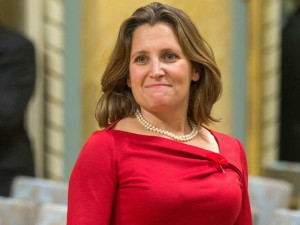
Chrystia Freeland, Canada's top NAFTA negotiator, said the talks between Mexico and the U.S. aren't exclusionary, but necessary.
Canadian trade officials renewed their desires to get a quicker resolution to the long-negotiated North American Free Trade Agreement between Canada, Mexico and the United States.
Initially expected to take less than six months, the talks are closing in on one year in length but have been often delayed by demands from the Trump administration — mandates the trading partners have been unwilling to meet.
However, with the latest delay in the rearview mirror, Mexico’s presidential election in early July, the three sides have been hurriedly talking to get the deal done.
Part of that push came last week as Mexican and U.S. cabinet ministers held a series of meetings in Washington D.C. One Mexican official expressed optimism that some kind of agreement could be reached by the end of the month — a concept that Canada’s Chrystia Freeland supported.
(GM adds Trump trade rep to head global public policy. Click Here for the story.)
“I and Canada are very, very keen to get it done as quickly as possible,” Freeland told reporters on a conference call without confirming if the late August deadline was feasible.
Mexican and U.S. officials are meeting again to haggle about issues such as wages and North American content rules for duty-free status.
Freeland said Canada’s lack of involvement in talks shouldn’t be interpreted as anything more than the need for the two sides to work out issues that don’t really affect Canada and that she is ready to join the talks at any time.
“While this is a trilateral agreement … there are also significant bilateral trading issues between each of the countries,” said Freeland, adding that she welcomed bilateral talks between Canada’s two NAFTA partners.
(Click Here to see why NAFTA talks are halted — for now.)
However, recent talks between Trump administration officials and the incoming Mexican president may have been designed to prime the pump for a new direction on talks, Jens Nordvig, CEO of Exante Data told CNBC last month.
If things go well with the Obrador meeting, Trump may try to use this new relationship as leverage on Canada to engage in bilateral talks, effectively ending NAFTA, which President Trump criticized during his campaign and on into his term in office.
However, that seems unlikely according to another observer. Juan Carlos Hartasánchez, Albright Stonebridge Group senior director, believes other more pressing concerns push back a NAFTA discussion.
(To see more about Trump’s auto tariff threat triggering backlash, Click Here.)
“It seems that everybody has kind of accepted that they are putting this off to November,” Hartasánchez told CNBC. “What they might try to discuss is whether they can advance in the interim so they are in place to announce an agreement in November.”
